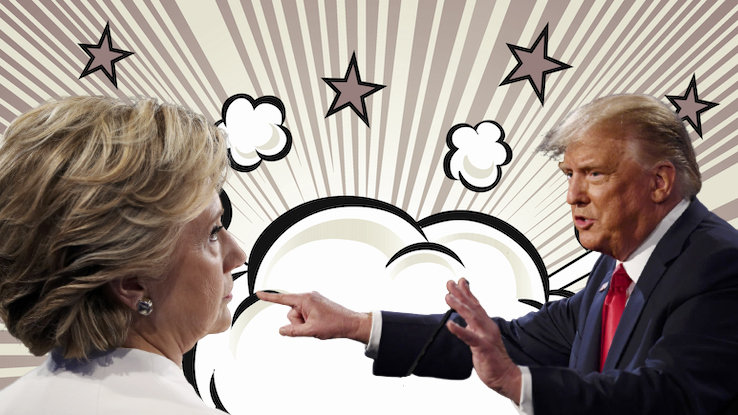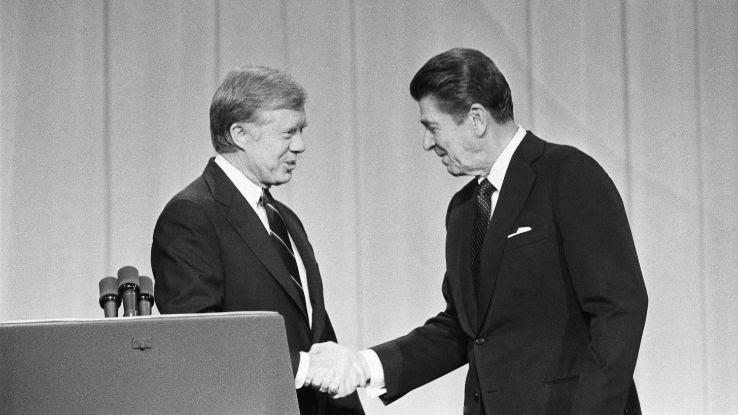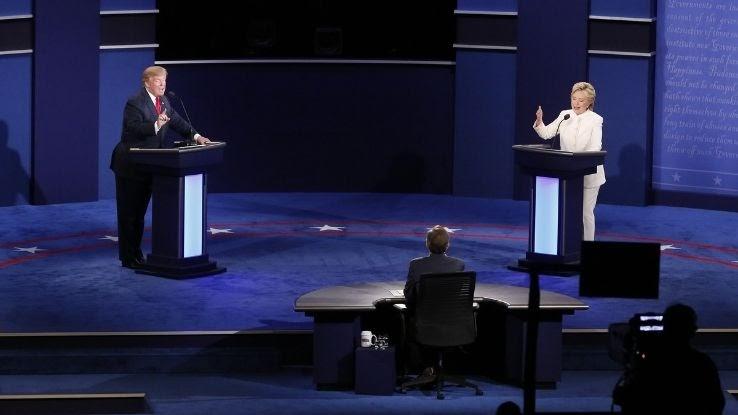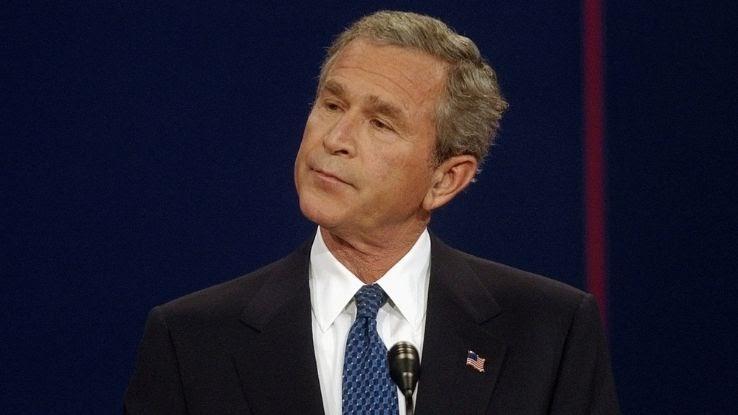Continuity Change in House Elections

Throughout American history, sometimes days before a presidential election is scheduled to take place, bombshell news stories have emerged that could've potentially had a drastic influence on the outcome of that election. In the political world, this is referred to as an "October Surprise" — a term coined by one of Ronald Reagan's campaign managers in the wake of a news story that developed and potentially could've been advantageous for the incumbent Jimmy Carter, depending on how it was used.
Whether elections seem too close to call or it appears there'll be a clear winner, the idea is that an October Surprise news story can arise and completely change voting behavior and the trajectory of an election. But have these unexpected events actually reshaped history at the last minute — and do they even have the power to? Answering these questions involves looking at how October Surprises came to be and what resulted from some of the most influential examples of this phenomenon.
How Did the October Surprise Officially Get Its Name?

U.S. elections, especially presidential ones, are often punctuated by October Surprises. These events can arise coincidentally, such as when they're the result of developing news stories, and they can be intentionally orchestrated, as in the case of wars. When they happen, candidates can seize the opportunity and use these events to their advantage — either by framing their opponent in a negative light or placing themselves in a better one — late in the campaign just before a November election. Ultimately, October Surprises are seen as events that can sway voters in a new direction, completely upending election outcomes in the process.
Although the phrase "October Surprise" only became part of the American political lexicon a few decades ago, these events have been part of the political game since the early 1800s, which is when some historians argue that the very first Surprise took place. Shortly before the 1840 presidential election, incumbent President Martin Van Buren, a Democrat, conspired with federal prosecutors to "charge top Whig politicians in New York with a 'most stupendous and atrocious fraud' in which they paid Pennsylvanians to travel to New York and fraudulently vote multiple times in the state's 1838 elections," notes Politico. The prosecutors waited until October to announce the news, hoping to maximize the impact of the story right before the election. The effort failed — Van Buren lost — but it's proof positive that American elections are no strangers to the October Surprise.
Perhaps the most memorable incident involving the October Surprise dates back to 1980, when Jimmy Carter and Ronald Reagan were running for president. The election took place on November 4, 1980. One year before that date, Iranian college students took over the U.S. embassy in Tehran in support of the Iranian Revolution. During the coup, they took 66 U.S. citizens and diplomats as hostages; the event became known as the "Iran hostage crisis." President Carter's administration continuously strategized and negotiated with the terrorists to safely return the hostages.
However, days before the 1980 U.S. election took place, the Iranian government made the unexpected announcement that they wouldn't release the hostages — who'd been imprisoned for nearly a year at that point — until after the U.S. presidential election had occurred. Then, on January 20, 1981, just minutes after Reagan was officially inaugurated, the Iranian government announced the hostages had been released.
This timing made political parties suspicious that Reagan's presidential campaign had worked with Iran to delay the release and sway votes. If the hostages had been released before the election in October — what Reagan's campaign manager William Casey called an "October Surprise" — it potentially could've worked in President Carter's favor. While no October Surprise happened before the 1980 vote, we have the events surrounding it to thank for a term that describes a vast number of upsets that have taken place in the weeks before presidential elections.

In recent years, the concept of an October Surprise has become much more common in the media — and it might feel like the Surprises themselves have increased in frequency, too. Since the term was coined, a number of these events have taken place during election cycles.
1996's Campaign Finance Controversy
The last weeks of the 1996 presidential election saw news that could've swayed the votes in presidential candidate Bob Dole's favor. It was revealed that Democratic fundraisers, including some who had ties to the Clinton White House, raised money illegally using contributions from non-U.S.-based donors. This news managed to shrink President Clinton's lead slightly. However, it ultimately didn't cause a drop in confidence that secured a win for Bob Dole — but it did lead to several convictions. Many criticized the investigation into illegal fundraising, including an FBI agent who claimed he didn't think the investigation team did a thorough job.
Bush's DUI News in 2000
The election between Al Gore and George W. Bush reached a peak in intensity a few days before the results were announced. Portland news reporter Erin Fehlau released a story about how, more than 20 years earlier, Bush had pleaded guilty to driving while intoxicated. Fehlau's news director fact-checked this story with Fox News, which immediately released the details to the public. This story became controversial quickly and may have led to Al Gore winning the popular vote but losing with the electoral college; political strategists believe the news may have caused a multi-percentage-point drop in support for Bush.
Hillary Clinton's Emails and Donald Trump's Comments
The 2016 presidential election saw multiple October Surprises from both parties. The first was the October 7 release of a video of Donald Trump making explicit remarks about sexually assaulting women. The video quickly spread to international news outlets, and many urged Trump to step down as they deemed his language abhorrent. Numerous Republicans immediately rescinded their support for the candidate in the wake of this story as well.
On the same date, WikiLeaks began releasing thousands of pages of emails that had been obtained by hacking into White House Chief of Staff John Podesta's personal email account. Emails between Clinton and Podesta revealed that, during her time as Secretary of State, Clinton set up a private email server at her home that she used for both work and personal correspondence. She appeared to have never used an official state.gov email account, which the U.S government would've managed and kept more secure. This made Clinton appear suspicious to the public, and some voters assumed she was hiding crucial information that would've made her an untrustworthy president.
Can an October Surprise Swing an Election?

It's wise to be skeptical of October Surprises — they're referred to as "conspiracies" in various circles, after all — but it's also essential to dig deeper to determine whether these events are as impactful as they seem. Throughout history, October Surprises have shown that, while the news can affect the popular vote and sometimes secure a win from either side, their effects on voters can vary widely. Although the 2016 presidential election in particular showed that the rise of social media could significantly impact voting behavior, it's also important to recognize that the electoral college plays a large role in the election process. Even though a presidential candidate may win a popular vote that shifted at the last minute, that doesn't guarantee a final victory.
Political science professor James Campbell has noted that the October Surprise may have played a more prominent role in the past in affecting an election's trajectory, especially if it ultimately allowed a candidate to appear to be the "lesser of two evils." Today's voters can access information much more easily and immediately than in decades past, however, and they're able to research false reports and biased stories planted by opposing political parties. This may be one reason why October Surprises aren't the bombshells they used to be.
There's no guarantee that an October Surprise will change the outcome of an election or even play a significant role in influencing it. That likelihood depends on the severity and relevance of the breaking story — and whether voters are willing to allow it to shift their perception.
Source: https://www.reference.com/history/october-surprise-history?utm_content=params%3Ao%3D740005%26ad%3DdirN%26qo%3DserpIndex&ueid=8fddc71b-8f11-45a8-920b-11783e804afd
0 Response to "Continuity Change in House Elections"
Post a Comment